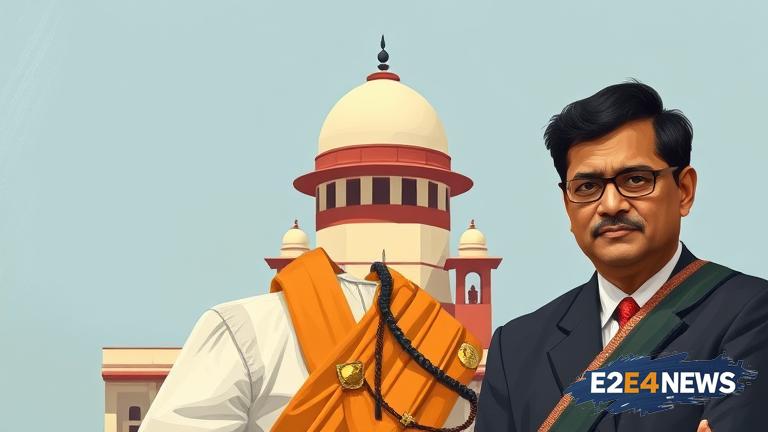The Indian judiciary has been embroiled in a controversy surrounding the elevation of Justice Vipul Pancholi to the Supreme Court. The Collegium, comprising the senior-most judges of the Supreme Court, had proposed Justice Pancholi’s name for elevation, but CJAR Justice Nagarathna has expressed her dissent. Justice Nagarathna’s dissent is based on concerns over seniority and merit, as she believes that there are other judges who are more deserving of elevation. The Collegium’s proposal has sparked a debate over the criteria for elevation to the Supreme Court, with some arguing that seniority should be the primary consideration, while others believe that merit and performance should be given more weight. The Indian judiciary has been facing criticism over the lack of transparency in the elevation process, with many arguing that the Collegium’s decisions are often shrouded in secrecy. The elevation of judges to the Supreme Court is a critical issue, as it has a significant impact on the administration of justice in the country. The Supreme Court is the highest court in the land, and its judges play a crucial role in shaping the country’s legal landscape. The Collegium’s proposal to elevate Justice Pancholi has been met with opposition from various quarters, with some arguing that he lacks the requisite experience and seniority. Justice Pancholi is a relatively junior judge, and his elevation would mean that several senior judges would be superseded. The supersession of senior judges has been a contentious issue in the Indian judiciary, with many arguing that it undermines the seniority principle. The seniority principle is a cornerstone of the Indian judiciary, and it is meant to ensure that judges are elevated based on their experience and seniority. However, the Collegium’s proposal to elevate Justice Pancholi has raised questions over the application of this principle. Justice Nagarathna’s dissent has highlighted the need for greater transparency and accountability in the elevation process. The Collegium’s decisions should be based on clear and transparent criteria, and the process should be subject to scrutiny and oversight. The Indian judiciary needs to ensure that the elevation process is fair, transparent, and based on merit. The elevation of judges to the Supreme Court is a critical issue that has far-reaching implications for the administration of justice in the country. The Collegium’s proposal to elevate Justice Pancholi has sparked a debate over the criteria for elevation, and it has highlighted the need for greater transparency and accountability in the elevation process. The Indian judiciary must ensure that the elevation process is fair, transparent, and based on merit, and that the seniority principle is applied in a consistent and transparent manner. The controversy surrounding Justice Pancholi’s elevation has also raised questions over the role of the Collegium in the elevation process. The Collegium is a powerful body that plays a critical role in shaping the Indian judiciary, but its decisions are often shrouded in secrecy. The Collegium’s proposal to elevate Justice Pancholi has sparked a debate over the need for greater transparency and accountability in the elevation process. The Indian judiciary must ensure that the Collegium’s decisions are based on clear and transparent criteria, and that the process is subject to scrutiny and oversight. The elevation of judges to the Supreme Court is a critical issue that has far-reaching implications for the administration of justice in the country. The Collegium’s proposal to elevate Justice Pancholi has highlighted the need for greater transparency and accountability in the elevation process, and it has sparked a debate over the criteria for elevation. The Indian judiciary must ensure that the elevation process is fair, transparent, and based on merit, and that the seniority principle is applied in a consistent and transparent manner. The controversy surrounding Justice Pancholi’s elevation has also raised questions over the impact of the elevation on the administration of justice in the country. The Supreme Court plays a critical role in shaping the country’s legal landscape, and the elevation of judges to the Court has a significant impact on the administration of justice. The Indian judiciary must ensure that the elevation process is fair, transparent, and based on merit, and that the seniority principle is applied in a consistent and transparent manner. The Collegium’s proposal to elevate Justice Pancholi has sparked a debate over the criteria for elevation, and it has highlighted the need for greater transparency and accountability in the elevation process. The Indian judiciary must ensure that the elevation process is fair, transparent, and based on merit, and that the seniority principle is applied in a consistent and transparent manner. The elevation of judges to the Supreme Court is a critical issue that has far-reaching implications for the administration of justice in the country. The Collegium’s proposal to elevate Justice Pancholi has highlighted the need for greater transparency and accountability in the elevation process, and it has sparked a debate over the criteria for elevation. The Indian judiciary must ensure that the elevation process is fair, transparent, and based on merit, and that the seniority principle is applied in a consistent and transparent manner.
